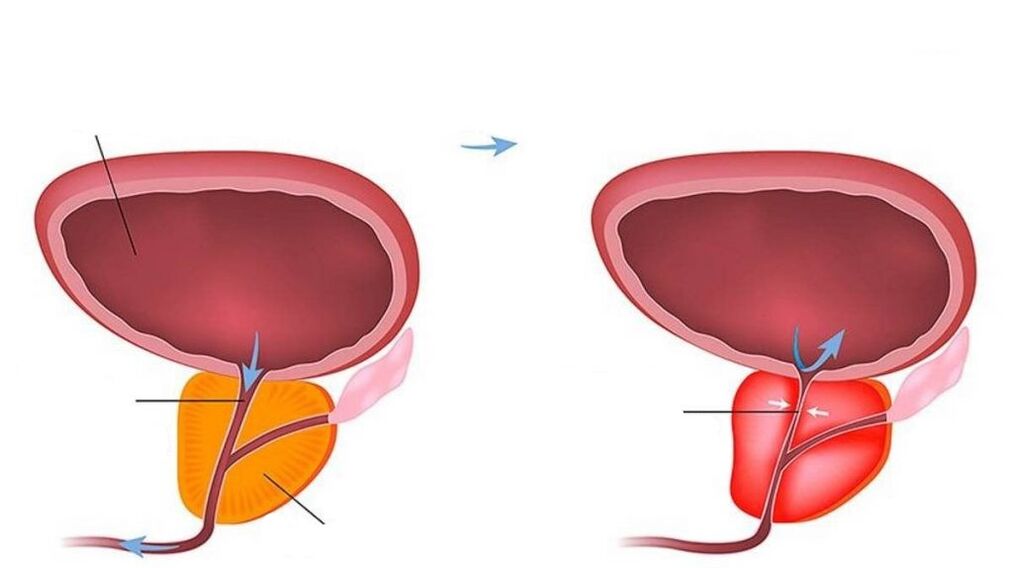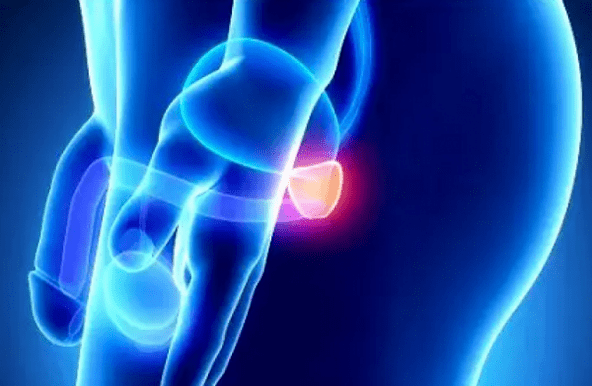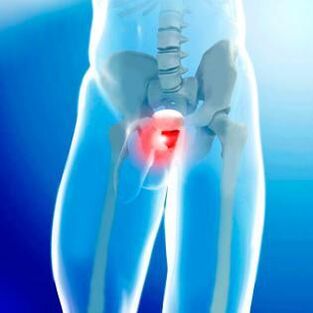Prostatitis is inflammation of the prostate, also called the prostate. This disease can occur for the following reasons:

- Infections.
- Bacteria.
- Viruses.
- Mushrooms.
- Long-term use of antibiotics, resulting in decreased immunity.
In many cases, the infection enters the body through sexual contact. As a result, stagnation occurs in the pelvic organs, and blood circulation weakens.
There are also non-infectious reasons why chronic prostatitis can develop:
- Sedentary lifestyle.
- Incorrect structure of the prostate.
- Damage to the perineum.
- Congenital pathologies.
- Swelling of the prostate.
- Low testosterone level.
- Hard physical labor.
- Hypothermia.
- Stress and nervous tension.
The emergence of this pathology is also possible due to the development or insufficiently effective treatment of such diseases:
- Sinusitis.
- Stones in the kidneys.
- Angina.
- Inflammation of the urethral canal.
In addition, prostatitis can occur due to inconsistent sexual activity and regular interruption of the act, which contributes to the development of stagnant processes.
Some facts to note:
- To maintain a healthy prostate, you need to have sex at least twice a week.
- It is not necessary to delay urination (this not only contributes to the development of stagnation, but also negatively affects potency).
- Regular use of tobacco and alcohol harms the prostate, so don't overdo it.
How do you know if the prostate is inflamed?
Manifestations of prostatitis can vary greatly depending on the degree of development of the disease. There are 3 stages:
- Discomfort appears in the lower abdomen. You often want to empty your bladder (with a burning sensation).
- The problems start in the genital area (erection worsens, pain is felt at the time of ejaculation, ejaculation occurs prematurely).
- At the last stage, the body temperature rises, pain occurs during urination, the patient shivers.
Important: if we are talking about chronic prostatitis, then in this case the development of pathology is usually not accompanied by the corresponding symptoms (or the manifestations of the disease are weakly expressed). The danger of this form is that an exacerbation can begin at any time.

Treatment of chronic prostatitis with folk remedies
There are many traditional methods used to treat prostatitis. Immediately we say that each of the methods we describe below should only be used after consulting a doctor. Keep in mind that not only can self-medication be ineffective, it can also make the problem worse.
Also, you need to understand that folk remedies do not allow you to completely get rid of chronic prostatitis. It makes sense to use them for the prevention of disease or as an auxiliary means, as well as drugs and physiological procedures prescribed by a doctor.
Garlic
Garlic is considered quite effective for the prevention and treatment of chronic prostatitis. Recipe:
- Take a few cloves of garlic.
- Throw them in a container (for example, a thermos) and pour in a quarter of a liter of boiling water.
- Drink before going to bed on an empty stomach.
There is also another recipe:
- Take three cloves.
- Pour in 200 ml of cold milk.
- Boil over low heat and cook for one minute.
- Insist for half an hour.
- Consume 35 drops four times a day after meals.
Onion bark decoction
Recipe:
- Peel the onions and rinse.
- Pour into a saucepan and pour half a liter of hot water.
- Boil for 5 minutes and let stand 60 minutes.
- Consume one teaspoon three times a day.
Combined intake of golden mustache balm and asparagus juice
To prepare a balm you need:
- Mix 150 ml of alcoholic golden mustache extract with 500 grams of linseed oil.
- Place in a closed container.
- Shake for 5-7 minutes.
You need to drink this balm for 10 days three times a day for one teaspoon, after that for another 5 days use asparagus juice the same number of times, 2-3 tbsp. l. Repeat the cycle twice.
Warming the prostate with birch tar
You need to take 3 tbsp. l of tar and pour it with 3 liters of boiling water. Then sit on this mixture for 7-10 minutes. The technique is effective in the early stages of prostatitis. It cannot be used in the presence of hemorrhoids or sexually transmitted diseases.

Aspen bark tincture
Immediately we say that the collection of bark should be carried out in early spring, when the leaves of the trees have not yet bloomed. This is very important, because during this period it is the most saturated with juice, which gives a healing effect. Collect the young bark that is no more than 5mm thick.
Recipe:
- Grind 100 g of dried bark.
- Top up with vodka until it completely coats the rind.
- Insist for 14 days, then strain.
- Consume 15-20 ml orally three times a day for a month.
Ivan tea tincture
Recipe:

- Grind ivan tea leaves and pour hot water in the proportions of 1 tbsp. l. per glass.
- Insist for 40 minutes.
- Remove the herb from the infusion and use a tablespoon per day.
Another recipe involves the use of not only leaves, but also flowers. They should be poured with a glass of boiling water. The infusion is prepared overnight. You need to take it twice a day for half a glass.
Aloe wine tincture with honey
Aloe and honey are products widely used in traditional medicine. To prepare medicine for prostatitis you will need:
- 0, 5 kg of aloe leaves (plants must be at least 3 years old).
- The same amount of honey.
- Half a liter of red wine (preferably dry).
You need to mix all these ingredients and insist for 5 days in a dark, dry place. For the prevention of prostatitis, you need to take 1 tablespoon 2-3 times a day. l. throughout the month. Then you need to take a 7-day break and repeat the course.
Lotions and soda baths
Soda helps to cope with infections that occur during prostatitis. The bath and the lotion are prepared according to the same recipe. It is necessary to dilute soda with boiling water in the proportions of 1 tbsp. l. per liter. Before starting the procedure, it is necessary to allow the solution to cool slightly.
Propolis tincture
Prepared according to this recipe:
- Crushed propolis should be poured with pure alcohol in proportions of 1 to 2.
- Place the medicine in a dark, not hot place.
- Infuse for 14 days, shaking occasionally.
- Filter at the end.
This remedy should be consumed on an empty stomach three times a day, mixed with warmed milk. Proportions: 15 drops of tincture per 100 grams of milk.
Tincture on the root and leaves of ginseng
10 units of ginseng will require 1 unit of alcohol diluted with water in proportions of 1 to 1. Insist for several days. To be consumed once a day. This recipe is not recommended if you have insomnia or high blood pressure.
Alcoholic infusion on the roots of aralia
Aralia has many beneficial properties which, among other things, have a positive effect on the condition of the prostate. But the problem is that this plant grows mainly in Eastern countries (Mongolia, China, Korea). In our latitudes it is quite difficult to get the roots of the aralia.
If you were successful, here is the recipe for making the tincture:
- Pour 20 g of roots with 70% alcohol at the rate of 100 ml (vodka will also work).
- Insist for several days.
- Drink 10 drops 3 times a day.
The drug is effective not only for prostatitis. It also helps to cope with sexual dysfunction. However, in the presence of cardiovascular diseases, this infusion cannot be used.
Infusion of dill on Port wine
Mix 100 g of pharmaceutical dill with 1 liter of port. The drug should be prepared within 3 weeks. Consume half a glass before meals. The tincture reduces inflammation of the prostate.
A mixture of nuts and honey
For a long time, nuts have been used to restore male strength. To prepare a drug for prostatitis, you must:
- Chop 5 nuts.
- Add half a glass of honey.
- Mix well.
To consume at the beginning of the day for 1 tbsp. l.
Chamomile tea and bath
To make chamomile tea, you need to pour 200 ml of boiled water in 1 tbsp. l. dried plant and insist for several hours. Consume three times a day on an empty stomach. The drug allows you to cope with the infection and relieve the inflammation.
A bath with chamomile infusion is prepared as follows:
- 5 tbsp. Pour the dried chamomile with hot water.
- We boil for several minutes and cook for about 2 hours.
- Add to bath when bathing.
Chestnut tea
Remove the shell from the chestnut fruit. Fill with hot water, boil for a few minutes and use inside. The taste of the drink is not very pleasant, so you can add a little honey.
Bathroom with pine needles
You need to boil the branches of a conifer (ideally pine) and pour it into the bathroom. The water temperature should not exceed 38 ° C. Raw materials can be collected independently or purchased at the pharmacy.
Pumpkin seeds
The last folk remedy for prostatitis on our list is pumpkin seeds. They should be consumed daily in 30 pieces. Helps both prevent the development of pathology and reduce the pain of symptoms.
Can inflammation of the prostate go away on its own?
Don't even expect prostatitis to go away on its own. This is not possible even in the case of the first stage. If proper measures are not taken, the disease will only progress and, therefore, develop into a chronic one.
See your urologist immediately if you have any symptoms. He will prescribe the necessary medication. In addition, treatment for prostatitis usually involves physical education and proper nutrition. In some cases, immunomodulators and antidepressants are prescribed.
What is the danger of prostatitis and how is it manifested?
Determining the presence of inflammatory processes in the prostate is quite simple. Prostatitis does not present a serious danger to human life. However, without qualified medical care, the pathology can lead to serious inconvenience, limiting life.
If the prostate is inflamed, it causes discomfort in the perineum and lower back. The disease is often accompanied by pain. It can be both painful and sharp. In particular, pain is relevant for men who do not have permanent sex.
If there are infections, mucus or pus may appear in the discharge. If the treatment is not started on time, it will ultimately lead to a deterioration in the quality of the sperm.
Can chronic prostatitis be completely cured?
Statistics of treatment of prostatitis indicate that relapses occur quite often. In many cases, the return of the disease is due to the fact that the patients do not have enough stamina to completely get rid of the pathology.
Of course, the treatment of prostatitis requires a lot of patience and considerable financial costs. So, for example, if there is an infection and the doctor prescribed antibiotics, in no case should they be stopped halfway, even if the disease has ceased to be felt. If you do not complete the drug treatment, the pathogens recover after some time and, moreover, become immune to the drugs you were taking.
So, although relapses often occur in chronic prostatitis, the patient's condition depends mainly on himself. If you strictly follow the doctor's recommendations, the signs of inflammation will not be felt for a long time, and may even go away forever.
Prostatitis tests
In any case, if prostatitis is suspected, the following procedures are prescribed:
- Blood test - helps identify inflammation by examining the level of white blood cells and erythrocyte sedimentation rate (ESR).
- Urinalysis - performed several times. Allows you to determine the increase in the level of bacteria and white blood cells.
- Study of prostate secretion - allows early detection of prostatitis, prostate cancer and infertility.
- Urine culture - allows you to determine the sensitivity of the bacteria that cause prostatitis, thereby choosing the right antibiotics.
In case of chronic prostatitis, a urine sample with 4 glasses is taken. This test helps to understand exactly where the infection is. The analysis is performed as follows:
- The patient fills the first tube with urine.
- After that, urination continues in the 2nd.
- The doctor massages the prostate. The secret that emerges is considered the 3rd test.
- The remains of urine coming out after the massage constitute the 4th sample.
Other laboratory tests are performed:
- If bacteria are found in the 3rd or 4th serving, it means the prostatitis is bacterial.
- If more than 10 leukocytes are also found in the same samples, there is inflammation of the prostate.
- If there are more than 10 white blood cells, but the bacterial flora is normal, this may indicate the presence of chlamydia and other infections.
In the latter case, a scratching of the urethra and mucosa is performed, which allows the detection of sexually transmitted microorganisms.
In some cases, with a digital rectal exam, there is a suspicion of adenoma and prostate cancer. This situation is grounds for diagnosis, in which a blood test is performed to measure the level of PSA (prostate specific agent).
Note: the PSA sample is taken no earlier than 10 days after the rectal examination.
What tests are done to diagnose prostatitis
For the treatment of prostatitis, antibiotics, antibacterial (non-steroidal) drugs, as well as drugs that increase immunity and improve blood supply can be used. However, it is impossible to prescribe the most effective drug therapy without a preliminary diagnosis, which makes it possible to understand the form of the disease.
Traditionally, an ultrasound (ultrasound) is performed if acute prostatitis is suspected. With this method, the doctor can:
- Determine the volume and density of the prostate.
- Find out if the prostate venous plexus is enlarged.
- Look for signs of an abscess.
In some cases, endoscopy is prescribed, but in acute prostatitis this method is contraindicated.
If prostatitis is accompanied by a neurogenic urination disorder, the following procedures may also be prescribed:
- The introduction of catheter probes to determine and record the urethral pressure profile.
- Myography, which allows you to assess the work of the pelvic floor muscles.
- CT and MRI, if there are prerequisites for prostate cancer or non-inflammatory prostatitis.
As part of conservative treatment, laser therapy, herbal medicine, magnetotherapy, electrophoresis, mud baths, and many other procedures may be prescribed. If this approach is ineffective, surgery is necessary.
Types of ultrasound examinations for various forms of prostatitis
According to statistics, in about 80% of cases of chronic prostatitis, pathogenic particles cannot be detected by laboratory tests. However, palpation also does not in all cases make it possible to rely on a correct diagnosis, since obvious structural changes do not always occur in the prostate.
Even in the case of chronic infectious prostatitis, bacteriological analysis is sometimes not very informative. As a rule, the diagnostic error is due to the fact that microbes accumulate in the tissues, but they do not enter the secretion, which is taken in the laboratory.
In this regard, ultrasound is almost always prescribed with scans. This procedure not only identifies changes in the prostate, but also dynamically monitors for improvements that occur during treatment.
In modern diagnostics, two types of ultrasound are used:
- Transrectal.
- Transabdominal.
Each of these techniques has unique advantages and disadvantages.
Transrectal method
In this case, an ultrasound machine is inserted into the patient's rectum. The method provides excellent visualization and allows you to collect the most comprehensive information about the condition of the prostate.
Contraindications:
- Hemorrhoids and anal fissures.
- Postoperative rehabilitation period.
- Benign and malignant tumors.
Transabdominal method
The prostate is examined through the anterior abdominal wall. The method allows you to determine the size and boundaries of the gland, as well as the symmetry of its lobes. The disadvantage of such an ultrasound is that not all hospitals use material, the quality of which allows reliable information on the condition of the tissues.
What are the possible consequences in the absence of treatment for prostatitis?
If prostatitis is left untreated, it can cause such complications:
- Prostate abscess, requiring immediate hospitalization and surgery.
- Formation of cysts and stones in the prostate, causing severe pain and requiring long-term treatment.
- Vesiculitis (inflammation of the seminal vesicles), which is only treated in a hospital setting.
- Sclerosis of the prostate, which causes urinary problems.
- Infertility.
What is the purpose of prostate massage?
Prostate massage is an intervention performed in all cases of chronic prostatitis, except calculous prostatitis. It is also named in such situations:
- In the absence of orgasm.
- In case of impotence.
- For diagnostic purposes (allows you to detect inflammatory processes).
Many men have certain prejudices about prostate massage, subconsciously identifying it with homosexuality. In fact, this procedure allows you to prevent the development of prostatitis, remove infected secretions, prevent the development of stagnant processes, improve blood circulation and increase male strength, increasing the quality of sexual intercourse.
However, there are situations in which prostate massage cannot be performed:
- Severe inflammation of the prostate.
- Tumor (benign and malignant).
- Infections of the genitourinary system.
- Hemorrhoids and anal fissures.
- Calculous form of prostatitis.
- Prostatic tuberculosis.
- Violation of urination.
- Exacerbation of chronic prostatitis.
Does chronic prostatitis interfere with normal sex and conception?
Chronic prostatitis usually does not have sexual problems. But it also happens in another way. It is quite understandable that inflammation of the prostate causes discomfort (not only physical, but also psychological). Painful sensations can make it difficult for a man to enter into intimacy with a partner. At the same time, psychological factors can lead to erection problems.
Separately, it is necessary to tell about the infectious form of chronic prostatitis. In this situation, during sexual intercourse there is a risk of transmission of bacteria or fungi to the partner.
Tip: If you do decide to conceive, be sure to get tested and make sure there is no infection. And if it is found, seek treatment.
Why is it important to have a regular sex life with prostatitis?
For the normal functioning of the body, it is important to ensure that all of its needs are met. The condition of the prostate has a significant impact not only on sexual activity, but also on the ability to conceive. This is due to the fact that the secretion produced in the prostate is the part of the sperm which is responsible for the vitality and activity of the sperm.
With inflammation of the prostate, metabolic processes in the cells of the gland are accelerated, which leads to the release of toxins that accumulate in the secretion. As a result, at the time of orgasm, these harmful substances leave the body with the semen, contributing to the normalization of the prostate and to accelerated recovery.
There is another important point: with prostatitis inflammatory processes occur, due to which the blood flow worsens. With sexual arousal, the blood supply to the penis increases dramatically, and at the time of ejaculation, the pelvic muscles contract. All this has a positive effect on the condition of the gland and helps to cope with prostatitis.
What is the likelihood of infertility in chronic prostatitis?
In the early stages, prostatitis is not an obstacle to conceiving a child. In some cases, there are erection problems caused by physiological and psychological factors. But with the right treatment and understanding on the part of the partner, the problem can be resolved.
It is quite another thing if you ignore the presence of prostatitis for a long time. The development of pathology can lead to a decrease in the quality of sperm: the sperm will become insufficiently active and will not be able to reach the point where conception occurs. In addition, this problem cannot always be detected by the results of the scans.
If you have prostatitis and cannot have children, see your doctor. In addition to treatment aimed at eliminating inflammatory and infectious processes in the prostate, a diet and vitamins are usually prescribed. While they do not increase the likelihood of conception, they do strengthen the immune system, which helps prevent new infections from forming.
What if you cannot conceive for a long time?
Doctors say that in a normal situation, conception should take place within a year of regular, unprotected sex. Otherwise, you need to see a doctor for a full examination.
A man is recommended to undergo the following procedures:
- Spermogram - allows you to determine the number of active sperm, as well as to assess the chemical and physical composition of semen.
- Genital ultrasound - aimed at studying the structures responsible for the formation and excretion of semen, as well as to identify problems with the blood supply.
A wider range of procedures is offered to women:
- Assessment of basal temperature over 3 menstrual cycles, followed by planning.
- Genital ultrasound.
- Hysterosalpinography - an image of the uterus and fallopian tubes to assess their anatomical structure and patency.
- Hysterosonography is an ultrasound examination of the uterine cavity.
- A blood test to determine the hormonal parameters of the endocrine system.
In some cases, problems with conception arise due to the incompatibility of the spouses. To determine the presence of this problem, a postcoital test is prescribed and a genetic examination is performed.



























